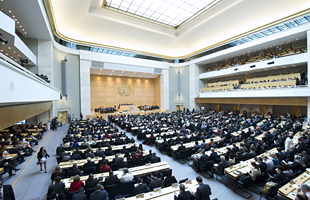World Health Assembly closes, passing resolutions on air pollution and epilepsy
 The World Health Assembly closed today (26/05/2015), with Director-General Dr Margaret Chan noting that it had passed several “landmark resolutions and decisions”. Three new resolutions were passed today: one on air pollution, one on epilepsy and one laying out the next steps in finalizing a framework of engagement with non-State actors.
The World Health Assembly closed today (26/05/2015), with Director-General Dr Margaret Chan noting that it had passed several “landmark resolutions and decisions”. Three new resolutions were passed today: one on air pollution, one on epilepsy and one laying out the next steps in finalizing a framework of engagement with non-State actors.
Air pollution
Delegates at the World Health Assembly adopted a resolution to address the health impacts of air pollution – the world’s largest single environmental health risk. Every year 4.3 million deaths occur from exposure to indoor air pollution and 3.7 million deaths are attributable to outdoor air pollution. This was the first time the Health Assembly had debated the topic.
The resolution highlights the key role national health authorities need to play in raising awareness about the potential to save lives and reduce health costs, if air pollution is addressed effectively. It also stresses the need for strong cooperation between different sectors and integration of health concerns into all national, regional and local air pollution-related policies. It urges Member States to develop air quality monitoring systems and health registries to improve surveillance for all illnesses related to air pollution; promote clean cooking, heating and lighting technologies and fuels; and strengthen international transfer of expertise, technologies and scientific data in the field of air pollution.
The resolution asks the WHO Secretariat to strengthen its technical capacities to support Member States in taking action on air pollution. This includes further building capacity to: implement the "WHO air quality guidelines" and "WHO indoor air quality guidelines; conduct cost-benefit assessment of mitigation measures; and advance research into air pollution’s health effects and effectiveness. At the Sixty-ninth World Health Assembly, WHO will propose a road map for an enhanced global response by the health sector that reduces the adverse health effects of air pollution.
Strengthening care for epilepsy
Delegates endorsed a resolution urging Member States to strengthen their ongoing efforts in providing care for people with epilepsy. Although affordable treatment for epilepsy exists, up to 90% of people with the condition may not be properly diagnosed or treated in resource-poor settings. The resolution highlights the need for governments to formulate, strengthen and implement national policies and legislation to promote and protect the rights of people with epilepsy. It also stresses the need to reinforce health information and surveillance systems to get a clearer picture of the burden of disease and to measure progress in improving access to care.
Delegates emphasized the importance of training of non-specialist health-care providers as key to reducing the epilepsy treatment gap. In low- and middle-income settings, strategies to improve access and affordability of antiepileptic medicines should be a priority. Countries are encouraged to undertake public awareness activities to reduce misconceptions about epilepsy and encourage more people to seek treatment. The research capacity of low- and middle-income countries should be built through expanded academic collaboration and establishment of centres of excellence.
The resolution calls on the WHO Secretariat to continue to lead and coordinate support to Member States in addressing the global burden of epilepsy so that people with epilepsy can receive timely treatment and can benefit from educational and occupational opportunities, free from stigma and discrimination.
Working with non-State actors
The Health Assembly welcomed the fact that delegates had reached consensus on many parts of the draft framework of engagement with non-State actors, noting that it wishes to finalize the framework by the next Health Assembly. Delegates requested the Director-General to convene an intergovernmental meeting as soon as possible and to submit the finalized draft for adoption at the Sixty-ninth World Health Assembly.
They asked the Secretariat to develop a register of non-State actors for next year's Health Assembly. Delegates acknowledged the importance of WHO engaging with non-State actors (nongovernmental organizations, private sector entities, philanthropic foundations and academic institutions) and of ensuring that risks of such engagement are managed robustly at global, regional and country level.
